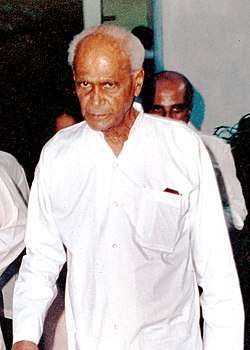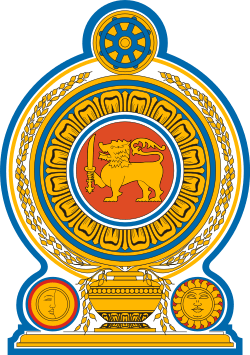Wijeyananda Dahanayake
| Hon. Wijeyananda Dahanayake | |
|---|---|
 | |
| 5th Prime Minister of Ceylon | |
|
In office 26 September 1959 – 20 March 1960 | |
| Monarch | Elizabeth II |
| Preceded by | Solomon West Ridgeway Dias Bandaranaike |
| Succeeded by | Dudley Senanayake |
| Member of the Sri Lanka Parliament for Galle | |
|
In office 1979 – 20 December 1988 | |
| Preceded by | Albert de Silva |
| Succeeded by | Constituency Abolished |
|
In office 1960 – 18 May 1977 | |
| Preceded by | W. D. S. Abeygoonawardena |
| Succeeded by | Albert de Silva |
|
In office 1947 – 5 December 1959 | |
| Preceded by | Constituency Created |
| Succeeded by | W. D. S. Abeygoonawardena |
| Personal details | |
| Born |
22 October 1901 Galle, British Ceylon |
| Died |
4 May 1997 (aged 95) Galle, Sri Lanka |
| Nationality | Sri Lankan |
| Political party |
Lanka Equal Society Party Ceylon Democratic Party United National Party |
| Alma mater |
S. Thomas' College, Mount Lavinia, Richmond College, Galle |
| Profession | Politician, Teacher |
Wijeyananda Dahanayake (Sinhalese: විජයානන්ද දහනායක Tamil: விஜயானந்த தகநாயக்கா; 22 October 1901 – 4 May 1997) was a Sri Lankan politician. He was the Prime Minister of Ceylon from 1959 to 1960.[1]
Early life

He was born as a twin in the Galle and was named Don Wijeyananda Dahanayake. His father was Don Dionesius Panditha Sepala Dahanayake, a scholar and specialist in oriental languages. His twin brother was Kalyanapriya Dahanayake.[2]
Dahanayake received his education from Richmond College in Galle and S. Thomas' College, Mount Lavinia. He became a teacher after completing his secondary education.[3]
Political career
Early years
Dahanayake became active in politics while serving as a teacher and switched to full-time politics. A Trotskyite, he was taken to courts by the British colonial administration for organizing a strike during the height of world war 2, but represented himself in court without a lawyer and won against the crown. He contested in a by-election to the State Council of Ceylon in 1944 from Bibile. Even though he lost to the bus magnate S.A. Peiris, he filed an election petition against his opponent and unseated him. He once again represented himself in court without a lawyer. In the following by-election, Dahanayake was elected to the State Council from Bibile. In 1947, he was only one of three members who voted against the Soulbury Constitution which enabled self rule for Ceylon as a dominion.[2]
In 1947, he was re-elected to the newly formed Parliament of Ceylon. He retained the seat in the next two elections in 1952 and 1956. He was a member of the socialist Lanka Sama Samaja Party (LSSP).
Minister of Education
With the landslide victory of S. W. R. D. Bandaranaike in the 1956 election in which the LSSP was part of the Bandaranaike's coalition, Dahanayake was appointed Minister of Education by Bandaranaike in 1956. In 1959, he became the acting leader of the house after the incumbent C. P. de Silva was taken to London for treatment after getting badly ill after consuming a glass of milk at a cabinet meeting.[2]
Prime Minister of Ceylon
Bandaranaike had been scheduled to go to New York to attend the UN General Assembly in late September 1959. With the absence of C. P. de Silva, Bandaranaike had sent a letter to the Governor General recommending that he appoint Dahanayake as acting Prime Minister during his absence. Bandaranaike was assassinated on September 26, 1959 and with the letter as a reference, Sir Oliver Goonetilleke, the Governor General of Ceylon appointed Dahanayake as Prime Minister. He was later confirmed by Parliament in this position. He also took on the office of cabinet minister of defence, external affairs, and education. He led the caretaker government for a year that proved to be controversial and difficult. He changed many ministers, sacking them overnight. His most notable action was the repeal of the Capital Punishment Act which suspended capital punishment in Ceylon.
Dahanayaka contested the March 1960 General Election in Ceylon being nominated from his newly formed Lanka Prajathanthravadi Pakshaya (Ceylon Democratic Party). He did not get enough votes to be re-elected as an MP, and lost his Galle constituency in that election.
Cabinet Minister
Dahanayake crossed over to the United National Party in 1965 and served as a cabinet minister of home affairs in Dudley Senanayake's government from 1965 to 1970 and cabinet minister of cooperatives in Junius Richard Jayawardene's government from 1986 to 1988. He remained a member of parliament from 1947 to 1988, with the exception of 1965 and 1977-1979, when he lost his seat. He holds the record for the longest speech in parliament of thirteen and a half hours.[2]
Death
Dahanayaka died on 4 May 1997 at the age of 95 in Galle, Sri Lanka.[4]
Personal life
Dahanayake was a simple man. When appointed Prime Minister, he moved into Temple Trees carrying his own things in an old suitcase. He found the prime minister's bed room too large and had it partitioned. When he resigned from the post of prime minister following his electoral defeat, he packed his personal belongings to the same suitcase left Temple Trees on foot and took a bus home to Galle.[2] He remained a bachelor throughout his life.
References
External links
- Website of the Parliament of Sri Lanka
- Sri Lanka Freedom Party's official Website
- Amara Samara in Sinhala
| Government offices | ||
|---|---|---|
| Preceded by S. W. R. D. Bandaranaike |
Prime Minister of Ceylon 1959–1960 |
Succeeded by Dudley Senanayake |
